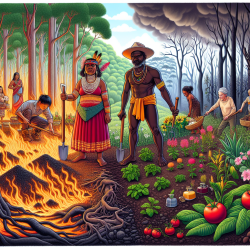The intersection of gardening, Indigenous health, and the impacts of climate change presents a unique opportunity for practitioners to enhance their skills and contribute positively to community well-being. The research paper "Gardening in Ashes: The Possibilities and Limitations of Gardening to Support Indigenous Health and Well-Being in the Context of Wildfires and Colonialism" by Kelsey Timler and Sandy Dancing Water provides valuable insights into this topic.
The Role of Gardening in Indigenous Health
Gardening is more than just an agricultural practice; it is a means of fostering a relationship with nature that supports holistic health. For Indigenous communities, gardening is deeply intertwined with cultural traditions and practices that have been disrupted by colonialism. Practitioners can play a crucial role in revitalizing these practices by understanding the cultural significance of gardening beyond mere food production.
Cultural Continuity Through Gardening
The research highlights the importance of viewing gardening as a practice that supports food sovereignty and cultural continuity. By engaging with traditional knowledge systems, practitioners can help communities reconnect with their ancestral lands and foodways. This approach not only addresses food security but also strengthens social cohesion and identity.
Challenges and Opportunities
The paper outlines several challenges faced by Indigenous communities, including the impacts of wildfires on ecosystems and the ongoing effects of colonial policies. However, it also identifies opportunities for practitioners to support resilience through land-based activities that honor traditional practices.
- Understanding Reciprocity: Practitioners should emphasize the concept of reciprocity in gardening, where plants are seen as partners rather than resources.
- Cultural Sensitivity: Engaging with Indigenous communities requires cultural sensitivity and respect for traditional knowledge systems.
- Sustainability: Implementing sustainable gardening practices that align with ecological principles can mitigate the impacts of climate change.
Encouraging Further Research
The dialogue presented in the research paper serves as a call to action for further exploration into how gardening can support Indigenous health. Practitioners are encouraged to conduct additional research that considers the socio-political contexts affecting Indigenous food systems.
The insights from this research are invaluable for practitioners looking to make a meaningful impact on Indigenous health through culturally informed gardening practices. By fostering relationships with nature and respecting traditional knowledge systems, we can contribute to the resilience and well-being of Indigenous communities.










